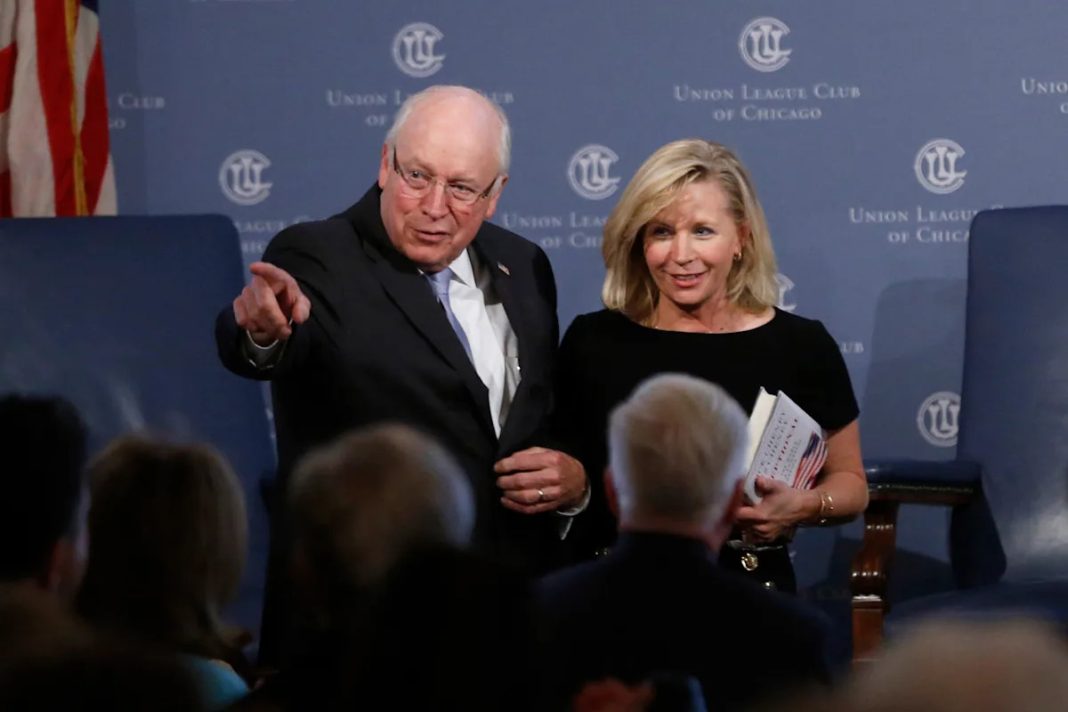Former Vice President Dick Cheney had a complicated relationship with the Republican Party over the past 10 years. At one time it would be hard to imagine that anyone would ever suggest that Cheney was a “RINO.” But by his death on Monday at age 84, the party he served had grown almost unrecognizable, due in large part to the unrestrained excesses of a man Cheney spent his last years forcefully criticizing: President Donald Trump.
Cheney was a Republican’s Republican and a conservative’s conservative. He served as White House chief of staff for President Gerald Ford, a Wyoming representative in the House, and was appointed Defense secretary by President George H.W. Bush before becoming the second Bush’s vice president.
Then-vice presidential candidate Dick Cheney with his wife and his daughter the morning after the election on Nov. 8, 2000. (David Hume Kennerly / Getty Images)
Cheney was not a moderate, in any sense of the word. And his unapologetically brutal positions on national security and the wars in Iraq and Afghanistan in particular earned him plenty of critics. In fact, Cheney’s first break with Donald Trump was tied to the so-called “war on terror.”
Early in the 2016 Republican presidential primary, during an interview with Fox News host Bret Baier, Cheney was asked to respond to Trump’s critical comments about 9/11. “He sounds like a liberal Democrat to me,” Cheney said, although he did still commit to supporting the party’s nominee — whoever that might be.
Obviously, Trump won that primary, and the subsequent general election, taking the party — and the country — by surprise. This was not the GOP that Cheney served with quiet consistency in the 1970s. But then Jan. 6 happened, and suddenly, our country found itself at a different sort of inflection point, with a different set of choices.
Cheney’s daughter, Rep. Liz Cheney, was thrust into the spotlight. Seemingly overnight, she became one of the most prominent politicians in America as she battled daily with Trump and his MAGA loyalists. Later, she served as the vice chair of the House Select Committee investigating the Capitol attack, one of the few prominent Republicans willing to condemn what millions of Americans had witnessed live on television.
In 2022, the former vice president joined his daughter, Democrats and President Joe Biden at the Capitol to recognize the anniversary of the attack. His presence spoke volumes, as both Cheneys were alone on the GOP side of the aisle as the House of Representatives stood for a moment of silence recognizing the horrific events that had taken place one year ago.
Liz Cheney was at the time in the middle of a hotly contested primary. With polls looking increasingly dire, she released a campaign video in which her father eviscerated Trump. “He is a coward,” the elder Cheney noted. “A real man wouldn’t lie to his supporters.” “In our nation’s 246-year history, there has never been an individual who is a greater threat to our republic than Donald Trump.”
However, it was Dick Cheney’s endorsement of Vice President Kamala Harris in the 2024 presidential election that ultimately severed any last vestiges of the relationship he once had with the MAGA-dominated Republican Party.
“Dick Cheney is an irrelevant RINO,” Trump responded.
On the day he died, flags at the White House were lowered to half-staff, yet there was no statement from Trump on his passing. Indeed, Trump himself didn’t publicly order the sign of respect for the longtime statesman and former White House occupant. When asked, White House press secretary Karoline Leavitt noted that the flags were lowered “in accordance with statutory law.” As it turns out, there is a federal law that states the American flag must be flown at half-staff until a former vice president’s day of interment.
To call Dick Cheney both an influential and controversial figure is an understatement on both counts. He was both a hero and a villain to many. He was a lifelong Republican; he was a patriot.
But in death, Cheney is still having an effect on the organization he helped shape for more than half a century. How to honor Cheney’s career appears to be something of a loyalty test for members of the Trump administration, as GOP leadership has marked his passing with mostly tepid statements and remembrances. Will he lie in state at the Capitol Rotunda? Will Republicans hesitate to pay respects? Just having to ask these questions makes one thing clear: This is no longer Dick Cheney’s Republican Party.
This article was originally published on MSNBC.com

